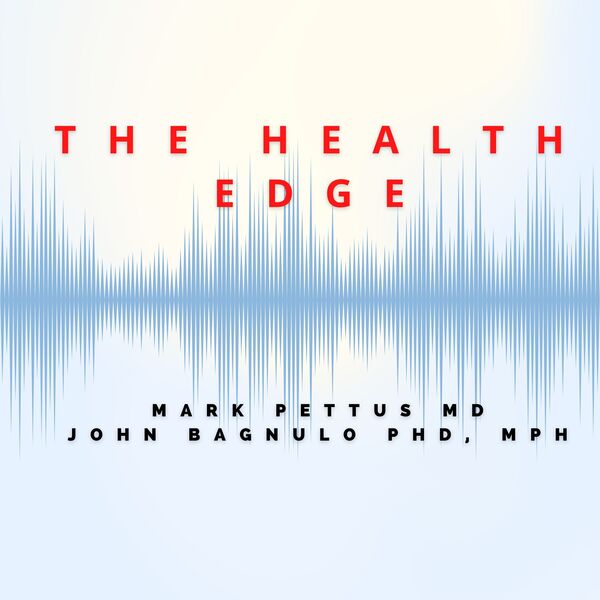Inaugaral launch of the Health Edge.
The Health Edge: Episode#2- Noteworthy changes in the modern human diet that fuel chronic, complex disease,
Mark and John explore the connection between noteworthy changes in the modern human diet and how they connect mechanistically to our current epidemic of chronic complex disease and diminished quality of life. They focus on the principles of unhealthy carbohydrate-dense foods and much higher ingestion on omega 6 seed-based processed vegetable oils.
The Health Edge: Episode #1 Evolutionary Biology and Epigenetics
John and Mark launch their first podcast episode of The Health Edge. Each reviews their backgrounds as clinician educators and how they reached their currents perspectives on how best to create health. They explore the emerging complex relationship between evolutionary biology and epigenetics i.e., how our environment shapes the expression patterns of the genes in our “Book of Life”.
The Health Edge: Preventing and reversing pre-diabetes, diabetes, and metabolic syndrome
John and Mark continue their conversation on the latest science to support effective and sustainable lifestyle changes to prevent or reverse obesity, pre-diabetes, diabetes and metabolic syndrome. They will explore the connection between common environmental inputs, inflammation, and insulin resistance. So epidemic has this disruptive metabolic landscape become for all ages that it is known to be strongly associated with all chronic complex diseases like cardiovascular disease, cancer, Alzheimer’s, and shorter life expectancy. It is also, for the most part, preventable and treatable with lifestyle interventions.
The Health Edge Episode #8: Lifestyle interventions to prevent-reverse pre-diabetes and diabetes
John and Mark continue their conversation on the latest science to support effective and sustainable lifestyle changes to prevent or reverse obesity, pre-diabetes, diabetes and metabolic syndrome. They will explore the connection between common environmental inputs, inflammation, and insulin resistance. So epidemic has this disruptive metabolic landscape become for all ages that it is known to be strongly associated with all chronic complex diseases like cardiovascular disease, cancer, Alzheimer’s, and shorter life expectancy. It is also, for the most part, preventable and treatable with lifestyle interventions.
Recent review papers related to this topic can be found in the Excellent Review Article section of the menu.
Statin related casualties…a growing list!

Effects of diet and simvastatin on serum lipids, insulin, and antioxidants in hypercholesterolemic men: a randomized controlled trial.
Jula A, Marniemi J, Huupponen R, Virtanen A, Rastas M, Rönnemaa T.
JAMA. 2002 Feb 6;287(5):598-605.
Mark and I have been discussing the various manners in which depleting mitochondria of cholesterol causes disease. Look closely at all of the antioxidants that become depleted with statins, and maybe more importantly, look at the increasing HOMA-1R score. These poor people are becoming more insulin resistant while on Simvastatin.
The Health Edge Episode #7: Diet and Heart Health
John and Mark discuss the connection between diet and heart disease risk-health. They reflect on a recent NYT editorial by Dr. Dean Ornish admonishing higher fat diet, red meat and animal protein.
Mark and John review various cardiometabolic risk factors and how they can be better managed with healthier food choices and control of inflammation.
The Health Edge
John and Mark discuss the connection between diet and heart disease risk-health. They reflect on a recent NYT editorial by Dr. Dean Ornish admonishing higher fat dieta, red meat and animal protein.
Mark and John review various cardiometabolic risk factors and how they can be better managed with healthier food choices and control of inflammation.
The Health Edge Episode #6: Why do we get fat?
John and Mark explore the science of weight loss and metabolism. They will review some critical “environmental inputs” that are known to disrupt fat-burning and create insulin and leptin resistance. Insulin and leptin resistance are the cornerstones of obesity, insulin resistance, diabetes and is a major metabolic risk for many chronic complex diseases. Insulin drives fat storage. It is impossible to burn fat as a fuel in a sustained fashion when insulin levels are high. Leptin resistance in our brains interferes with satiety. We interpret…”keep eating” and “lay-low” so as to avoid burning precious energy. These are the exact opposite signaling interpretations one wants to lose weight and sustain the loss.
John and Mark will provide some news to use for actionable lifestyle changes that can better calibrate these systems.
